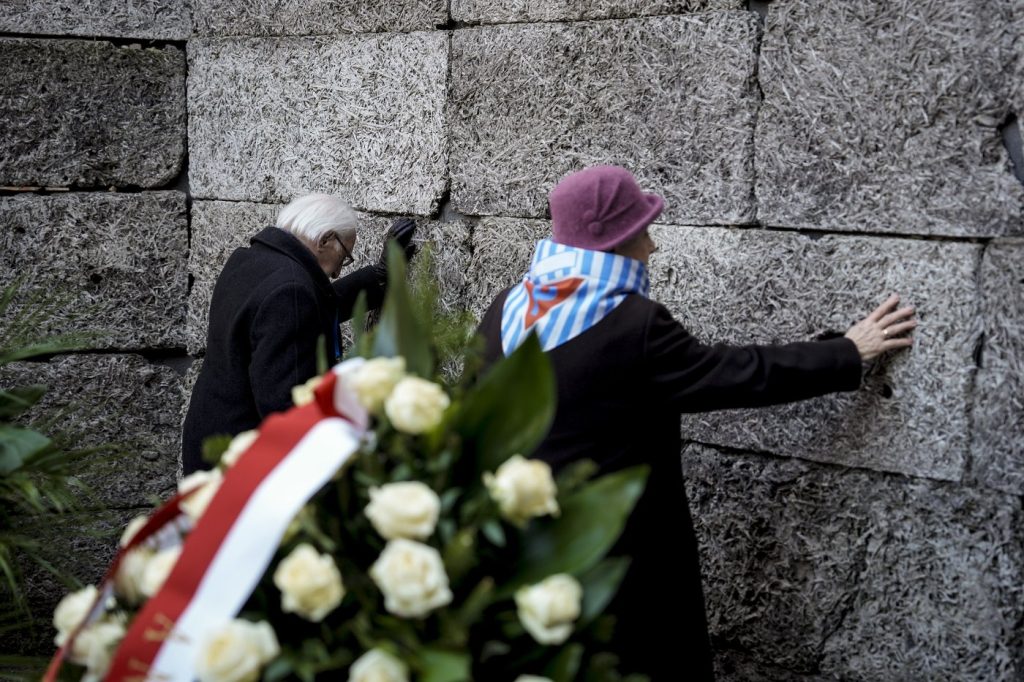OSWIECIM, Poland (AP) The 80th anniversary of the liberation of Auschwitz by Soviet troops is being commemorated on January 27, 2025, at the site of the former death camp. This ceremony is regarded as the last significant observance that numerous survivors are likely to attend, given their advanced ages.
During World War II, Nazi German forces murdered approximately 1.1 million individuals at Auschwitz, located in southern Poland. This horrific figure includes a vast majority of Jews who were exterminated en masse in gas chambers, alongside Poles, Roma, Soviet prisoners of war, gay individuals, and others deemed undesirable under Nazi racial ideology.
Amid solemn reflections, elderly survivors, donning blue-and-white striped scarves reminiscent of their prison uniforms, gathered at the Death Wall, where many prisoners were executed, including Polish resistors against the Nazi occupation. They were accompanied by Polish President Andrzej Duda, who held a candle and walked beside Auschwitz-Birkenau State Museum director Piotr Cywinski. At the wall, both men bowed their heads, muttering prayers and making the sign of the cross.
President Duda expressed to reporters that "We Poles, on whose land occupied by Nazi Germans at that time the Germans built this extermination industry and this concentration camp, are today the guardians of memory." He articulated the "unimaginable pain" experienced by countless individuals, particularly the Jewish community, and acknowledged the survivors present as "the last survivors coming to this site." In a poignant moment, he added, "May the memory of all the dead live on, may they rest in peace."
The Nazi regime exterminated 6 million Jews from across Europe, effectively erasing two-thirds of the continent's Jewish population and one-third of Jews globally. To honor the victims, the United Nations designated January 27 as International Holocaust Remembrance Day in 2005.
Across Europe, various officials and citizens paused to reflect on the Holocaust's horrors. British Prime Minister Keir Starmer emphasized that "The Holocaust was a collective endeavor by thousands of ordinary people utterly consumed by the hatred of difference," stressing the importance of standing against such hatred in contemporary society.
Later in the day, world leaders, members of royalty, and elderly camp survivors are expected to gather, with the youngest survivors in their 80s. Notably, politicians have not been invited to speak this year, allowing the focus to be on the survivors themselves. Approximately 50 survivors are anticipated to attend.
Among the prominent attendees will be German Chancellor Olaf Scholz and President Frank-Walter Steinmeier, marking the first time both leaders have participated in such a commemoration. This act symbolizes Germany's ongoing commitment to acknowledging its historical atrocities amid a rise in far-right sentiments that seek to diminish this narrative.
Other dignitaries expected to join the observance include French President Emmanuel Macron, Canadian Prime Minister Justin Trudeau, and British King Charles III, along with royal representatives from Spain, Denmark, and Norway.
Historically, Russian officials were central guests at anniversary observations to acknowledge the Soviet Union's role in liberating the camp and honoring its substantial losses in defeating Nazi Germany. However, since Russia's invasion of Ukraine in 2022, they have been excluded from the commemorative events.










